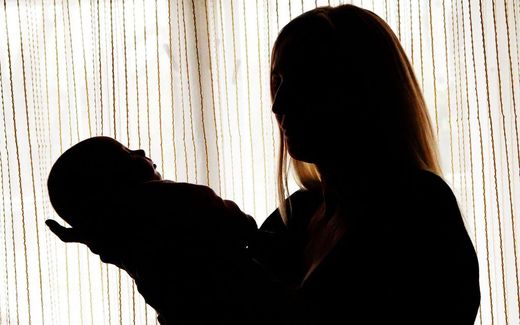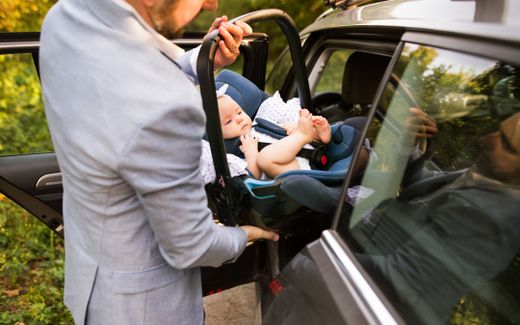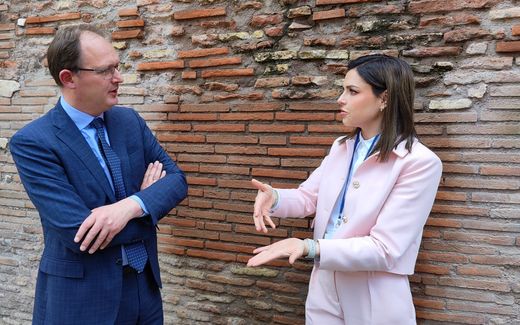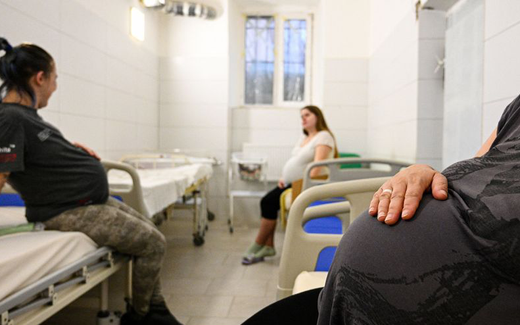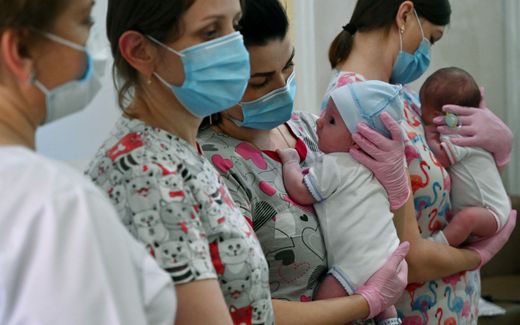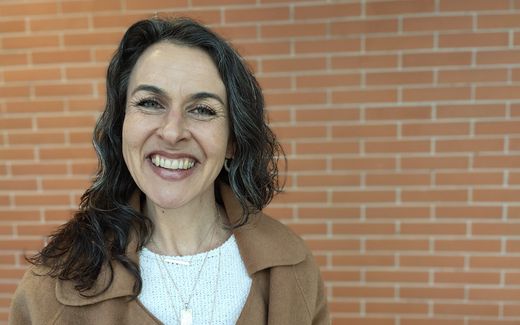Surrogacy is a risky experiment with kids, says German author Birgit Kelle
19-06-2025
Central Europe
Jitka Evanova, CNE.news
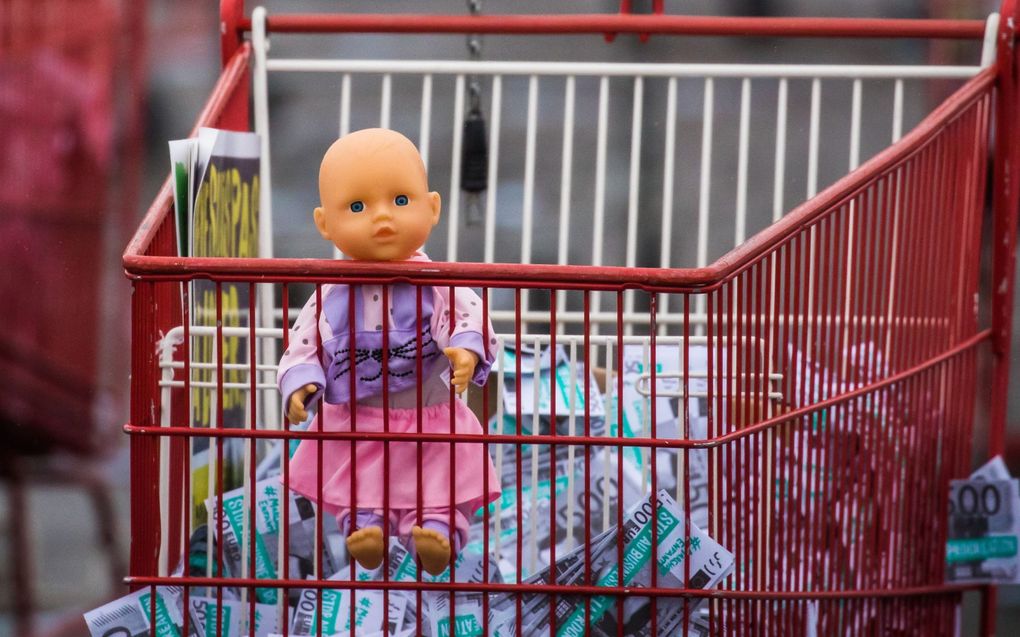
A doll in a shopping cart as a protest against surrogacy. Photo EPA, Christophe Petit Tesson
Central Europe
Slavery is forbidden. But in Georgia, there is a farm that keeps women for their eggs. Human trafficking is prohibited. But you can sell the child that grew in your womb, although your other children might be shocked. The German author Birgit Kelle says this is nothing less than child trafficking.
Stay up to date with Christian news in Europe? Sign up for CNE's newsletter.
A few weeks ago, Birgit Kelle was in Czechia for the presentation of the Czech translation of her book on surrogacy (see text box below). The presentation was facilitated by the organisation Aliance pro rodinu. In the surrogacy market in Europe, the Czech Republic has a particular place. Kelle spoke there, answered questions and gave an interview afterwards.
Can you explain the process of surrogacy?
“If you want to have a child, you go on the internet and find dozens of agencies. You pick one, contact it, and they make you an offer. They have different prices from which you can choose. The price depends on your wishes. If you want to have a guaranteed healthy child or a specific gender, it is more expensive.
Then they send you a catalogue where you can search for your favourite surrogate mother. If you don’t have your own eggs to use, they send you another online catalogue where you can search for the right egg donor. The surrogate mother is never pregnant with her own eggs.”
Why not?
“They do not want the surrogate mother to have a genetic link to the child. In that case, she could later say: “It is my child.” And she could prove it. Then no court could force her to give away her child.
After this, they produce the embryo and put it into the surrogate mother. Every surrogate pregnancy is risky because of the missing genetic link. Often, you need several tries, and miscarriage is common.
“There are no official checks. It is a big problem and a big difference to adoption.”
After the birth, you pay all the fees, travel to Ukraine or the United States, and get the birth certificate for the child from the clinic. With that, you go to the consulate of your country, which gives you a passport, and you can bring the child home.”
In case of children's adoption, the whole process is controlled by official checks and balances. How is this with surrogacy?
“There are no official checks. It is a big problem and a big difference to adoption. For adoption, we have international standards to prevent abuse. As a parent you need to be healthy, have money, and you are supposed to have no criminal record.
However, surrogacy is completely private business, so there is no state involved in checking you, you don’t have to tell the government you are ordering a human being. The agency is just interested in your money. It is really a big problem.
For example, we see single men or elderly people who are in their sixties, seventies buying a child. What do they want to do with a baby? In some countries we already have encountered cases where police found paedophiles who bought surrogacy kids, mostly boys, and were abusing these children.
There is another problem. We know that in some poor countries, women are raped, and then they sell their children. Nobody knows where these children go. These are mostly poor uneducated women who even don’t know how to read the contract they are signing.
From corrupt countries, we also know that there might be a link between surrogacy and the illegal sale of organs, so some of these children might be produced just because people want their kidneys.”
It sounds more like human trafficking.
“Exactly, it is nothing else. In Western countries we only see surrogacy in magazines, we have prominent people with happy babies and everything is fine. Yet, we just see the surface, we don’t see the dark market that is underneath.”
How is it in Europe?
“The biggest and the cheapest surrogacy market in Europe is in Ukraine. In the first months of the war, they had real problems. There are hundreds of babies born every month and when the war started, clients could not come. Hundreds of babies were stuck in Ukraine.
And pregnant surrogate mothers were not allowed to flee the country because they were supposed to give birth in Ukraine. If a Ukrainian woman gives birth in Germany, for example, she is considered to be the legal mother of the child. If she gave the child away, she would be accused of child trafficking. Also, many surrogate mothers have already their own children, so they were forced to stay in Ukraine with their children when the war started.
“The product might have failures, it might not be healthy, so you need to do an abortion.”
There was the same problem with the corona crisis and lockdowns. When you start a business like this, when you start treating babies like objects, then it is just a business and a business can have problems. We had a logistical problem with the ‘product’.”
That sounds horrible.
“Yes, but I always say if you say A, you need to say B. If you consider a production of a human being just as a business, then you can have problems like any other business does. The product might have failures, it might not be healthy, so you need to do an abortion. Or you have a client not paying, or a client not showing up to pick up the product. Many things can go wrong.”
Do you know how many children are sold like this?
“The statistics are not complete. It is believed there are at least 10,000 babies sold every year. The main market is in the United States. We have quite reliable data from the US and Ukraine where surrogacy is legal, but from other countries we don’t have the numbers.
At the same time, we do have numbers on the profit from this market. There is an institute in the USA (Global Market Insights, note JE) that examined the surrogacy market, and they say it brings in around 14 billion dollars a year now. But they predict that it will be 130 billion dollars in ten years. They expect the business to grow very fast.”
Is there any research on how these children prosper when they get older?
“No, there is not. We are doing a big experiment on a living child at the moment. Many clients want to stay anonymous, and a lot of children don’t even know that they are not living with their biological parents. If those children have medical or psychological problems or trauma, nobody knows why.
We also don’t have any research on the health of surrogates after giving birth. We just have more and more surrogate mothers speaking, usually anonymously, to people from the press. They suffer because they gave away a child. They suffer from medical problems. Their bodies are bombed with hormones and the same medical treatment as people with an organ transplant.
“We now have thousands of children feeling that their home is not secure any more.”
It is hard medical treatment, and the women have to take it during pregnancy. It definitely leaves an impact on their bodies. And it might leave an impact on the unborn child. We don’t know, again, there is no research.”
You said that the surrogate already needs to have her own family. How does surrogacy affect the rest of her family?
“All surrogate mothers have their own children. Why? You only take women who already gave birth to a healthy child because you want to make sure that they have no problem getting children. It reduces the risks. Another reason is that the medical treatment can make you infertile. The third reason is that the agencies want the women to concentrate on children they already have.
You can find quotes of children who watched their mothers selling a brother or a sister. The view of the child is this: “If mummy is pregnant, I am going to have a brother or a sister.” I found quotes of some of these children telling their mum: “Can we keep my brother, sister?” Or: “Mum, you wouldn’t give me away, would you?”
We now have thousands of children feeling that their home is not secure any more. They interpret it as that their parents consider some of their brothers or sisters not worthy enough to be loved because they sell them.
Some agencies allow contact between the child and surrogate mother. But if the child gets in contact with the surrogate, it will realise that mum already has other children whom she kept and think: “I was sold.” I don’t know what it does with the mind of a child, but it might think: “What was wrong with me? Why did she love them but gave me away?” We don’t know what it does to the heart and mind of a child to realised that it was sold, that it has a price tag.
“If we can agree that a kidney cannot be traded, why don’t we agree that the whole child cannot be traded as well?”
That’s why I say that on one hand, it is child trafficking, treating a child like an object you can buy. And on the other hand, it is an abuse of women and their bodies, a new form of prostitution. You don’t sell sexuality, but your fertility.”
Do you see any way out?
“The only way out would be if we get an international ban. As long as we don’t have the ban in every country, and we don’t agree that human trafficking of small human beings is as bad as human trafficking of adult human beings, this business will continue.”
Is it possible?
“I think so. We had times –and it is not so long ago– when slavery was considered OK. As mankind, we managed to agree that you cannot sell or buy a human being because it is ethically wrong. We did it with organ trading too. If we can agree that a kidney cannot be traded, why don’t we agree that the whole child cannot be traded as well?”
About Birgit Kelle
Birgit Kelle (born 1975) is a Romanian-born German. She is mother of four children and works as an author about social topics. She regularly expresses herself against the modern understanding of feminism and gender mainstreaming. In her writings, she reflects the teaching of the Christian tradition regarding sex and family.

In 2024, she wrote a book in German about surrogacy, with the title “I buy myself a child” (Ich kauf mir ein Kind). This book was translated into Czech in 2025.
Related Articles


